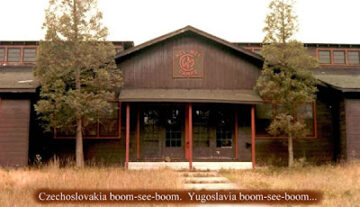by Barbara Fischkin
The place where I learned the most about diversity, equity and inclusion was not at my liberal summer camp in New York’s Catskills mountains—but at a pig farm in northern Kansas. To be fair, if it wasn’t for camp, I never would have pitched a tent under the big sky of the Jensby farm.

I was there because, as my last chapter noted, Wel-Met, my summer sleep away camp, had a free-range philosophy. Campers planned their own activities, hiked into the woods for sleepovers and—when older—lived in tents rather than bunks. This was a preparation for the next step: Cross-country camping trips. Wel-Met ran six of these each summer and in the 1960s they all stopped at the farm of Clarence and Florence Jensby. The Jensbys welcomed all with open arms—campers and returning counselors alike. (I arrived three times). On the surface, we could not have been more different. Or in today’s lingo, more diverse. Most of us were Jewish New Yorkers. The Jensbys were Christian midwesterners.
It did not matter. With great panache, the Jensbys introduced us to their operation and their pigs who, well, smelled like pigs. This came as a surprise to the city slickers. Mrs. Jensby demonstrated, with schoolteacher-like skills, how to prepare a live chicken for dinner. Trip after trip, year after year, she showed city kids how she would break the chicken’s neck, pluck the feathers, yank out the guts and prepare it for cooking. Some campers were horrified. I saw her humanity. I saw her as a farmer who worked quickly to minimize suffering. Today, when I view pictures of chickens raised in crowded coops, not free-range—or hormone or antibiotic free—I think of how Mrs. Jensby did it better.
I also have a memory of Mrs. Jensby dressed up, wearing her good shoes and leaving the farm—perhaps for church. I wondered how she did this without stepping on any animal droppings. I wondered how she had transformed herself so quickly from farm wife in a blood-stained apron to a “proper” lady. A lifelong lesson: there is more to a person than you see at first. Read more »
